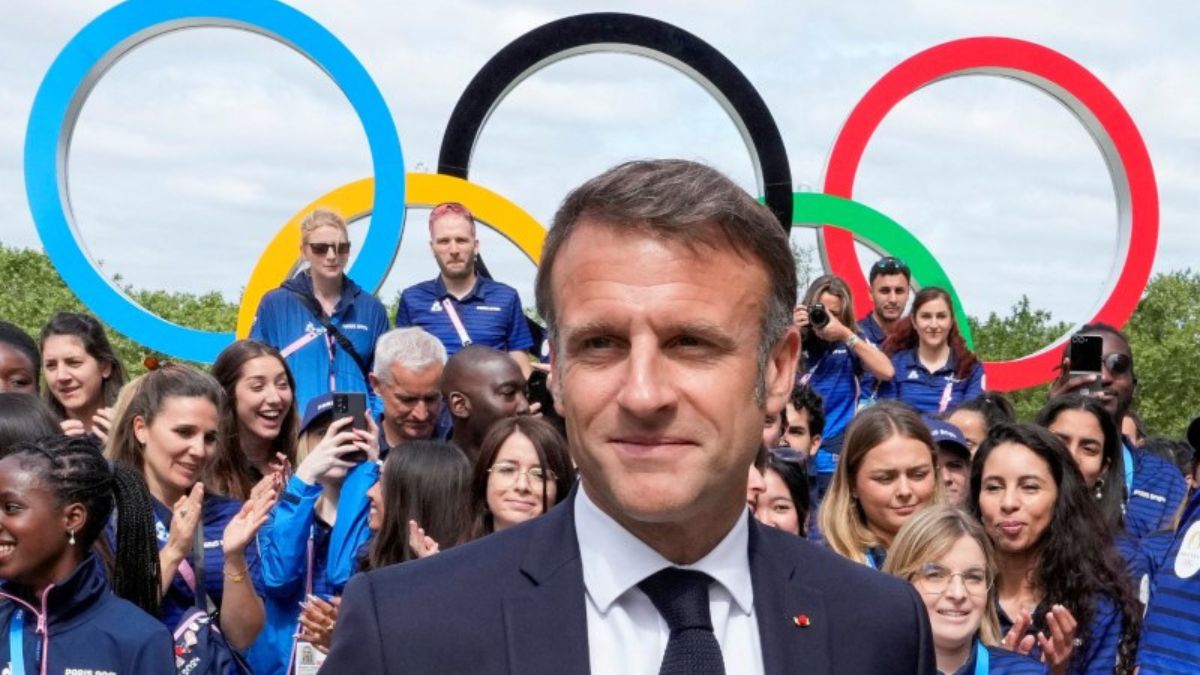A month after French snap polls, President Emmanuel Macron has still not decided his prime ministerial nominee. As the Olympics are over, the public gaze is back on politics read more
)
French President Emmanuel Macron meets with French athletes as he visits the Olympic village for the 2024 Summer Olympics, in Paris, France, July 22, 2024. File Image/Reuters
Euro News ran a piece on Tuesday joking that the Phryge mascot of the Olympic Games has emerged as the favourite among social media users to be appointed as the next French prime minister. The question is back to the French national debate as the Games are over and medalists have returned home.
The pause button that the Paris Olympic Games have pressed has been released. President Emmanuel Macron has to soon appoint a prime minister — hopefully before August 28, when the Paralympic Games begin.
Why it matters
Appointment of a French prime minister does have a history of attracting international attention. At least in recent decades, the French presidents have found it easy to choose a leader from their own party, given the popular mandate that has gone with them in elections.
However, apparently rattled over the far-right National Rally’s victory in the European election in June, Macron called for an early national election in July. The election saw leftist coalition New Popular Front emerge as the single-largest party with 188 seats in the 577-member National Assembly.
The Macron-led centrist coalition Ensemble came second with 162 seats and the National Rally third with 142 seats.
Leftist leaders claimed victory but Macron refused to recognise their claim, putting the choice of prime minister on an elusive consensus candidate. Macron wants to have a candidate who is not from the far-right or far-left wing of French politics. His centrist party does not have the mandate to stake claim to the post. So, the question remains — though unattended through the Olympic Games — who Macron and parties would choose as the next prime minister.
The first claimant
NPF leader Lucie Castets is the only candidate who has officially nominated herself in the race to become the next French prime minister. A high-ranking civil servant in Paris, Castets has the support of top NPF leadership across the alliance spectrum that includes the Socialists, Greens, Communists. She also has the support of three-time presidential candidate and France Unbowed movement leader Jean-Luc Melenchon. She is credited with rebuilding the left coalition ahead of the parliamentary election.
But the problem is Macron has rejected her prime ministerial bid, arguing no one has won the snap poll. With its smaller allies, the NPF tally goes up to 193 in the National Assembly. But it needs 289 members to prove Macron wrong.
Castets has hit back at Macron but with little avail. “This denial of democracy, by refusing to recognize the political group that came out on top in the elections, is egregious,” she told a French radio station.
A socialist in contention
Bernard Cazeneuve holds the distinction of having had the shortest tenure as prime minister in modern French history, having served the presidency of Francois Hollande from December 2016 to May 2017. He may have another shot at the job. Macron’s second ongoing term ends in 2027.
French political observers view Cazeneuve as a possible compromise candidate — outside the NPF. Cazeneuve, on his part, has been vocal about his openness to return to Matignon, the prime minister’s residence. Last month, he said, “I have never refused to put wisdom where there is folly. If it has to be done in a collective way, I’m always prepared to do that.”
It’s however not clear whether Macron and the NPF would agree to name Cazeneuve as the prime minister. He had quit the Socialist Party of Hollande in 2022 over an alliance with France Unbowed, the largest leftist party.
Will Macron go right-of-centre?
With his party having lost the election, Macron has to choose an agreeable leader as his prime minister to signal “cohabitation” — a balancing act in French politics. Xavier Bertrand, who has served in ministerial roles under former Presidents Jacques Chirac and Nicolas Sarkozy, can be a centre-right coalition candidate if leftist party does not agree on a name that suits Macron.
Reports say that Bertrand is “ready to take up the challenge”. But the problem again is of numbers. Macron’s front and Bertrand’s Republic Right group together have 213 seats — 20 more than the NPF’s, only a fragile lead. Macron has to walk a tightrope as France awaits its prime minister.

 1 month ago
6
1 month ago
6
)
)
)
)
)
)
)
)
)
)
)
)
)
)
)
)
)
)
)
)
)
)
)
)
)
 English (US) ·
English (US) ·